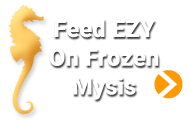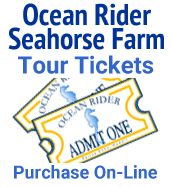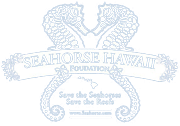- FAQ Categories
- Aquarium Life
- Conservation
- Seahorse FAQ’s
- Seahorse Medicine FAQ’s
- Web Site Features & Sales
Fenbendazole (brand name of Panacur) is an inexpensive anthelmintic agent (dewormer) used for large animals such as horses, and the de- worming granules can be obtained without a prescription from stores that carry agricultural products (e.g., farm and ranch equipment, farming supplies and products, veterinary supplies, livestock and horse supplies, livestock and horse feed) or via the Internet from places such as KV Vet Supply. The granular form of fenbendazole (horse dewormer granules 22.2%) is preferable to the paste for aquarium use, as the dosage of the granules is easier to regulate (Liisa Coit, pers. com.). It is available in packets of 5.2 grams or 0.18 ounces.
Fenbendazole is very useful for debugging live rock (LR) and eradicating bristle worms, hydroids and Aiptasia rock anemones. Because fenbendazole is essentially a de-worming agent, it will destroy any bristle worms, flat worms, spaghetti worms or the like. The FBZ or Panacur treatments are thus best administered to the live rock in a bucket or hospital tank before the LR is introduced in the main tank. Otherwise, the massive die-off of the worm population in the aquarium may require large water changes in order to prevent a dangerous ammonia spike!
Fenbendazole does not have any adverse effects on biological filtration, but be aware that it is death to many Cnidarians besides hydroids and Aiptasia. Mushrooms and related corals are generally not affected, but expect it to have dire effects on other corals (e.g., sinularias), polyps, gorgonians, and anemones. In general, any Cnidarians with polyps that resemble the stalked family of Hydrozoans are likely to be hit hard by fenbendazole, so don't use this treatment in a reef tank!
Also be aware that fenbendazole seems to soak into the porous live rock and be absorbed indefinitely. I know one hobbyist who transferred a small piece of live rock that had been treated with fenbendazole (Panacur) months earlier into a reef tank, where it killed the resident starfish and Astrea snails. So enough of the medication may be retained within treated live rock to impact sensitive animals months after the fenbendazole was administered. Don't treat live rock intended for reef systems with fenbendazole (Panacur)!
At the lower dosage recommended for nursery tanks (1/16 tsp. Per 10 gallons), fenbendazole normally does not harm cleaner shrimp and decorative shrimp. With the exception of Astrids (Astrea), Coit and Worden have found it does not usually affect the types of snails typically used as cleanup crews (e.g., Nassarius, Ceriths, and Nerites). It will kill starfish but copepods, hermit crabs, and shrimp are normally not affected.
Macroalgae such as the feathery or long-bladed varieties of Caulerpa or Hawaiian Ogo (Gracilaria) are not harmed by exposure to fenbendazole at even triple the normal dose. In fact, if you will be using Caulerpa in your nursery tanks to provide hitching posts for the fry and serve as a form of natural filtration, it's a very wise precaution indeed to treat them with a regimen of fenbendazole beforehand.
So fenbendazole (FBZ) or Panacur is primarily useful for ridding bare- bottomed nursery tanks and dwarf seahorses setups of hydroids and Aiptasia anemones, ridding Caulerpa and other macroalge of hydroids or Aiptasia before its goes into the aquarium, and cleansing live rock of bristle worms, hydroids, and Aiptasia rock anemones before it is introduced to the aquarium. If you are serious about raising seahorse fry, fenbendazole is must-have med for keeping your nurseries hydroid free.
It can also be used to eradicate bristle worms, hydroids, an Aiptasia from an established aquarium if it does not house sensitive animals such as live corals and gorgonians, starfish, Astrea snails, or tubeworms and other desirable worms that may be harmed by FBZ, providing you monitor the ammonia levels closely and are prepared to deal with the ammonia spike that may result from the sudden death of the worm population.





